
Natural PMS Relief For Women
Reviewed by Lisa Blohm, PhD, MSN, RN
In this article
PMS. If those three innocent-looking letters have you moaning, groaning, and reaching for your heating pad, you’re not alone! PMS is a condition that affects up to 90% of women, so chances are, you’ve had a run-in with at least some of the symptoms. And while it’s something so many women deal with each and every month, there’s still a lot to learn about PMS — and how to find natural PMS relief too.
Keep reading if you’re looking for advice on how to treat PMS symptoms naturally. In this post, we cover everything you need to know about PMS and the changes you can make to your lifestyle and diet to help when you’ve got PMS.
SUBSCRIBE ON YOUTUBE FOR MORE HEALTH-RELATED VIDEOS!
What is PMS?
PMS stands for premenstrual syndrome…as in, it happens just before your period starts. PMS has to do with your hormones and the impact that it has on your emotions, moods, behavior, and physical well-being right before your period.
The symptoms experienced and their severity varies greatly from woman to woman. There is no specific research providing evidence as to “why” it occurs. The regular cyclical patterns of hormones throughout each menstrual cycle certainly seem to be the commonality — but each woman experiences things differently.
While it doesn’t necessarily have a specific label (people continue to argue about how to correctly classify it), PMS is something that affects the majority of women in the USA. In fact, it is medically accepted that PMS symptoms affect 90% of menstruating women in the USA.
Who gets PMS?
Anyone who has a vagina and menstruates can get PMS. Does that mean that every person who has a vagina and who menstruates gets PMS? No. But many do! It’s incredibly common.
Upwards of 90% or more of the female population experience PMS to varying degrees. Some women experience it only mildly, while others find PMS debilitating. And there are certain health conditions that may make you more likely to experience or worsen your symptoms of PMS.
You’re more likely to experience PMS symptoms if:
- You Had Postpartum Depression: If this is something you experienced after giving birth, you may be more likely to have PMS, or have worsening PMS symptoms as you age.
- You’re Super Stressed: Prolonged periods of stress aren’t good for your health, in general. But a heightened stress response, over a long period of time, can worsen a woman’s PMS symptoms. Stress can even cause temporary cessation of menses.
- If You Have Occasional Depression: When you have occasional or long-term depression, PMS can further affect your mood and mental well-being.
- Your Family Has PMS: If your grandma, mom, or sisters suffer from PMS, you’re more likely to, as well.
- You’ve Suffered From Substance Abuse: If you like to indulge in alcohol or you’ve had a substance abuse problem in the past, it can increase the likelihood that you’ll experience PMS.
- You’ve Experienced Physical Trauma: When your body’s been through a lot, and your immune system’s working overtime to keep you healthy, you may be more likely to have PMS.
What causes PMS?
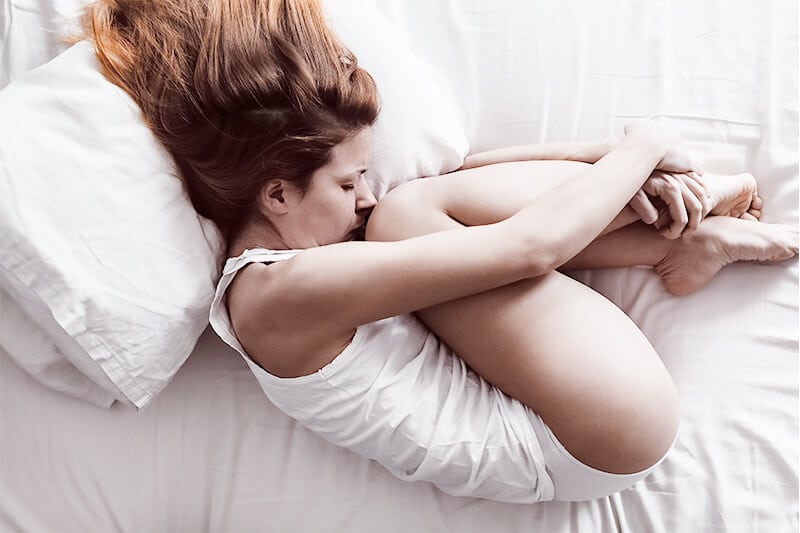
Well…we actually don’t know for sure. There’s still a whole lot of discussion going on about what exactly causes PMS! We do know hormones are involved, and we know it occurs when your body’s getting ready to menstruate. But, beyond that, it’s not clear just what causes all of the symptoms we associate with the syndrome.
Right before that time of the month, your body’s preparing itself for a baby. And that means your female reproductive hormones spike high. When you don’t get pregnant, and start to menstruate, those hormone levels drop back down to normal — quickly.
Many believe that it is this hormone fluctuation that causes many PMS symptoms. After all, rapid hormone fluctuation has been linked to headaches, mood swings, and more. Additionally, there are chemical changes going on in your brain when your body’s going through these hormonal changes. And they play a role in causing PMS, as well.
When do you get PMS?
Thankfully, you don’t need to worry about PMS all the time. It’ll only affect you for a short period of time before your period. Some women notice symptoms up to 14 days before their period. But, for most, they start to notice symptoms a week or so before the flow.
When you have PMS, symptoms usually subside as your monthly cycle starts. Though, when you actually have your period, many of the same symptoms carry over! You could continue to feel bloated, have cramps, and still have those mood swings.
But, technically speaking, that’s not classified PMS, since it’s happening during your period and not in the PRE-menstrual portion of your cycle. Confusing, right?
What are the symptoms of PMS?

When it comes to PMS, it can help to consider symptoms in two categories: physical PMS symptoms and mental or emotional PMS symptoms. It’s a complex disorder that can bring on a variety of urges, moods, aches, and pains. Here are some of the most common PMS symptoms to watch out for:
Physical symptoms of PMS
Your body goes through a whole lot when you’re menstruating. It’s actually a very impressive process and one that can take a physical toll on your body — especially if you have PMS. Some physical symptoms you may experience when you have PMS are:
- Swollen Or Tender Breasts: If your boobs feel sore, you can thank your hormones during PMS.
- Constipation Or Diarrhea: If you notice a change in your bowel movements, it may be a sign you have PMS.
- Bloating Or Gas: Feel as big as a balloon that’s ready to pop? Bloating and gas are common PMS symptoms.
- Cramping: Oooh, cramps are no fun for anyone. And they’re a big indicator that you’ve got PMS. Cramping is also common during menstruation itself.
- Abdominal Pain: If you have other abdominal pain (different from cramping pains) you may have PMS to blame.
- Headaches Or Migraines: If you get hormone-related migraines or headaches, it’s a sign you have PMS.
- Lower Back Pain: Feel a gentle ache in your lower back? Yep, that’s probably PMS as well.
- Weight Gain: If you feel like everything you eat is clinging to your figure, it may indicate you have PMS. It’s not uncommon for women to briefly gain a pound or two right before and during their period.
- General Aches & Pains: If you’re sore all over and it’s almost time for your period to start, you know the most likely culprit.
- Fatigue: If you don’t want to get out of bed and are dragging your way through the day? Menstruation is a lot of work for your body and PMS makes it even harder.
- Swollen Hands or Feet: Thick ankles and puffy fingers have you concerned? Yep, they’re a symptom of PMS too.
- Skin Changes: Possibly one of the most well-known signs of menstruation is acne. This is an incredibly common sign of PMS. So, if a pimple’s popped up overnight and you’re nearing that time of the month, PMS is probably the skin-changing culprit.
- Sleep Changes: If you find yourself snoozing less or more than normal, it’s yet again related to those hormonal shifts. Do yourself a favor, and listen to your body as much as you can.
Mental and emotional symptoms of PMS
- Appetite Changes Or Food Cravings: You may notice you’re hungry all the time, or absolutely nothing sounds appetizing to you.
- Trouble With Concentration Or Memory: PMS could also make it hard for you to focus on everyday tasks or concentrate at work.
- Mood Swings: While this is actually less common than many other signs of PMS, mood swings certainly give PMS the bulk of its notoriety.
- Depression: You may have increased feelings of depression when you’ve got PMS.
- Irritability: Hello, short fuse! This is another sign that you’re experiencing PMS.
- Crying Spells: Sobbing over seemingly nothing? PMS is likely to blame!
- Anxiety: If you’ve got that jittery, worried feeling going on more than normal, PMS might be to blame.
- Social Withdrawal: If you’re normally a social butterfly and you feel like staying home shortly before your period, it could be a sign of PMS — or just your body telling you it’s time to slow down and do some self-care.
- Changes In Sexual Desire: Not in the mood? Or suddenly really in the mood? Hormonal fluctuations can definitely affect your libido. For some, these changes are normal, but for others, this can be a sign of PMS.
Common PMS misconceptions

PMS seems to be something we talk about…a lot. But, for something mentioned so frequently in conversation, there’s still far too much confusion surrounding PMS. Here are some common misconceptions we’ve seen when discussing PMS — and what’s actually true:
Untruth #1: PMS is not real
When we talk about PMS, we’re not talking about the tooth fairy, Santa Claus or Bigfoot. We’re talking about an actual health condition with proven diagnoses, symptoms, and there are lots of women who’ve experienced it firsthand. Still, many people (and by people, we mainly mean…men…) think that PMS is just an excuse for mood swings, irritability, and food cravings. While these definitely can be symptoms of the condition, they’re not necessarily the only things you experience with PMS. And they DEFINITELY don’t mean it’s a made-up syndrome!
Part of the confusion may stem from the confusion around the classification of PMS. Is it a disease? A mental health illness? Maybe, a mood disorder? It’s always been a tricky thing to label, so it’s understandable some people just don’t know what to make of PMS. But, we can assure you, it’s very real. For many women, it is a serious health condition that significantly impacts their lives every single month.
Untruth #2: Everyone gets PMS

Nope, nope, nope. Just no! You and your body are unique. So is hers, and so is his, and so is everyone else! Not everyone will experience PMS and the experiences of women who do struggle with PMS will vary. While most women experience some PMS symptoms at some point in their life, some women don’t ever get PMS. (Talk about winning the health lottery, right?)
Untruth #3: PMS symptoms are the same for everyone
As discussed above, there are many, many PMS symptoms. The number of symptoms, and severity of each one, will (you guessed it!) differ depending on the person. Some women have pretty extreme PMS symptoms, each and every month. Some women have occasional PMS that doesn’t really get in their way. This fluctuation in symptoms and symptom severity is 100% normal.
That said, it’s a widely accepted fact that if you do experience PMS, symptoms tend to get worse as you age. So, a woman in her mid-thirties will likely have more intense PMS than a young gal who just got her period.
Untruth #4: Lots of pain is normal
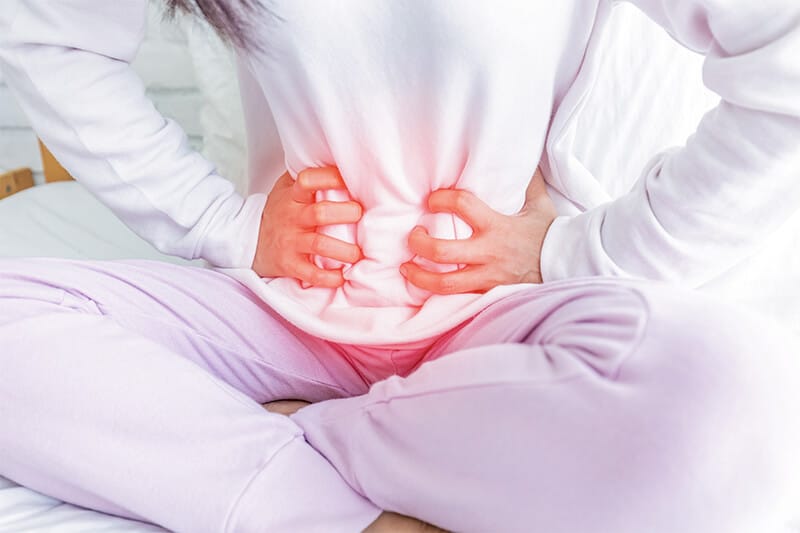
Lots of pain before or during your period is far from normal! While stomach cramping, digestive distress, and general aches and pains can indicate you have PMS, extreme pain is definitely not on the list of ‘normal’ PMS symptoms. If your pain’s debilitating, interfering with your livelihood and ability to go about your normal day, seek medical attention. You could have other health issues such as endometriosis or polycystic ovarian syndrome.
Unfortunately, many women with extreme period pain are entirely disregarded by the medical community or told that it’s ‘stress’, ‘weight issues’, or ‘mental health disorders’ that are the source of their extreme discomfort during periods. The result is many women who are not correctly diagnosed with these disorders for years.
At The Healthy Place, one of the things we are most passionate about is actually hearing women when they talk about their health problems. We are always here to help champion you and support you in your health journey.
Untruth #5: PMS is all about hormones
If you’re playing a game of true or false and you get this one as a question: ‘PMS is controlled by hormones’…what would you answer?
If you guessed ‘false,’ you’d be correct. While there’s certainly research to suggest that hormones play a key role in PMS, they’re not the only thing that causes it or affects it. Chemical changes in the brain, genetics, existing health conditions, diet, and lifestyle all play a role in whether or not a person will experience PMS and to what extent. Keep in mind that ALL menstruating women have a fluctuation in hormones during their cycle, but NOT all women experience PMS.
When you should seek medical attention for PMS symptoms
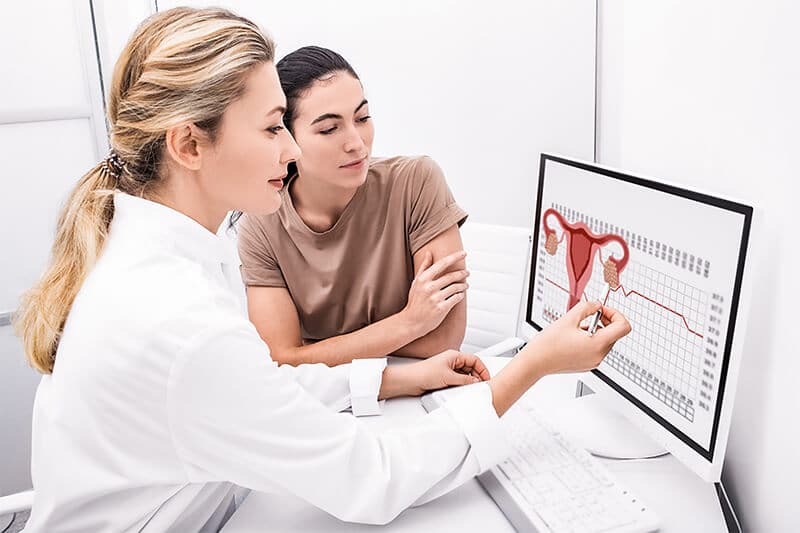
PMS is common and the symptoms are experienced by many. But that doesn’t mean you should suffer in silence or ignore severe symptoms.
If you haven’t had a conversation with your doctor about PMS before, it’s a good idea to bring it up, even if your symptoms are mild. They’ll be able to give you tips for tracking symptoms, pain management, and more. And let you know whether or not you’re actually experiencing PMS, or something else.
If your PMS symptoms are severe enough to interfere with your daily life, definitely talk to a doctor. There’s nothing normal about extreme abdominal pain, extreme mood swings, or seriously heightened anxiety! We’d recommend seeing an OBGYN or a holistic medical provider.
Other medical conditions with similar symptoms
PMS can also affect existing medical conditions. so it’s a good idea to discuss a health plan with your healthcare provider if you have:
- PMS and Anxiety: Since anxiety is a symptom of PMS, if you suffer from anxiety normally, it may be more severe right before your menstrual cycle.
- PMS and Depression: Similarly, if you suffer from occasional depression or depressive episodes, PMS can make emotional and mental symptoms of depressions more noticeable or cause them to worsen.
- PMS and Fatigue: When you have PMS, you may experience fatigue. So, it’s no surprise that if you suffer from fatigue at other times it’ll likely be worse during PMS.
- PMS and IBS: When it comes to your gut, PMS symptoms can aggravate those who already suffer from IBS. Speak to your doctor if you have IBS and suspect you have or are developing symptoms of PMS.
- PMS and Allergies: If you’re prone to allergies or are experiencing an allergic reaction, PMS might make it worse!
- PMS and Migraines: Migraine sufferers take note. PMS can induce migraines. But, if that’s you… we’re guessing you already knew that one.
Other medical conditions with similar symptoms
PMS symptoms often mimic those of some serious health conditions, as we mentioned already. And that’s exactly why it’s important to discuss PMS with your doctor, especially if symptoms are severe! Some medical conditions you could have instead of PMS include:
- Endometriosis: This is a disorder that affects your uterus and can be extremely painful.
- PMDD: This is also called Premenstrual Dysphoric Disorder, and it’s often considered a ‘more severe version of PMS.’ Many of the symptoms are the same but are even more unpleasant.
- PCOS: Polycystic ovary syndrome, or PCOS, affects your hormones. It’s a condition that can’t be cured, but symptoms can be managed with the help of a healthcare professional.
Traditional medical PMS treatment
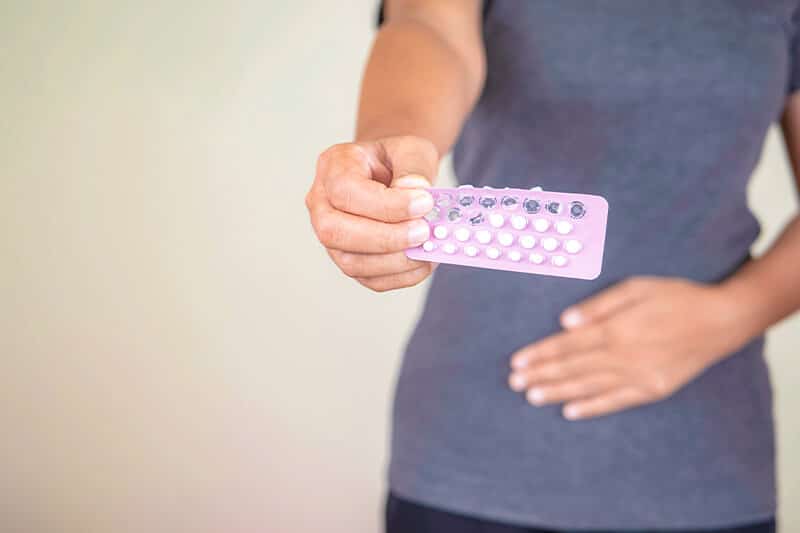
Okay, so you have PMS…now what? There are lots of treatment options, and your doctor can discuss many traditional PMS treatments with you. When you visit your primary caregiver, you’ll most likely discuss solutions that include:
- Over the Counter Pain Relief: For PMS, your doc may suggest you pick up a bottle of Ibuprofen or Aspirin to help with PMS-related pain. If your lower back’s sore, you’ve got a migraine or stomach cramps, this can be a good option when you need immediate PMS pain relief every now and then. But if you’re relying on popping Tylenol every few hours for days on end, that’s very hard on your liver and not a healthy or realistic long-term strategy. So, keep reading!
- Hormonal Birth Control For PMS: This is something a lot of doctors prescribe to help balance your hormones and reduce PMS symptoms. It’s always best to discuss the pros and cons of hormonal birth control with an expert before you go down that road, but many women find PMS relief when they start taking the pill. Just be aware of your body, as some women also experience undesirable side effects from hormonal birth control that can mimic PMS symptoms.
- Antidepressants For PMS: If you suffer from depression and you have PMS, antidepressants may be a good option to support mental wellness and mood balance. They work to regulate your mood, which is beneficial when you have PMS.
- Anti-Anxiety Medications for PMS: Similarly, anti-anxiety medication is prescribed to help you feel less anxious and reduce the severity of panic attacks and other anxious reactions. If you have PMS, and worsening anxiety symptoms because of it, anti-anxiety pharmaceuticals can be extremely helpful.
- Diuretics For PMS: Taking water pills, aka Diuretics, when you have PMS can help prevent bloating and weight gain. Many doctors prescribe them if other water-retention methods haven’t helped, and they can be a powerful healing tool for PMS-sufferers.
How to relieve PMS symptoms naturally

But, what do you do when you want natural PMS relief? The good news is, there’s actually a lot you can do to help relieve PMS symptoms naturally! With changes to your lifestyle and diet, plus PMS-targeted supplements, you can improve PMS symptoms and even help with PMS severity. Here’s what you need to know about natural PMS relief:
Lifestyle changes for PMS relief
The way you go about your day inevitably affects your health, and it can play a key role in PMS symptom experience, as well. So, if you’re sick of feeling tired, grumpy, and sore before your period, make some changes to your lifestyle for natural PMS relief.
- Does Exercise Help PMS: In short, yes! And while it’s commonly discussed that getting a move on can help with cramps, it’s also beneficial when it comes to mental and emotional wellness during PMS too. Exercise, and not just before and during PMS, helps support a balanced mood and encourages your body to release plenty of those ‘happy’ hormones that put you in a good mood. Exercise also contributes to hormonal balance overall!
- Get Lots Of Sleep: When you’ve got PMS, your body’s extra stressed. Give it the rest it needs to recoup, recover and prepare for the menstrual cycle you’re about to embark on. Your body does some incredible things when you have your period, so support it with plenty of sleep. Get yourself some self-care!
- Stress Less: Speaking of stress, do what you can to reduce stress when you have PMS and your period. Take up meditation. Try yoga. Take a relaxing bath. Whatever gets you ‘zen,’ take some time to unwind and destress in the days leading up to your period. By lowering your cortisol levels, you can help your body better cope with PMS symptoms.
- Hello, Sunshine!! Some good ‘ol natural Vitamin D works wonders when you’ve got PMS. Get yourself outside and enjoy some sunshine — after you’ve applied sunscreen, of course. Vitamin D, when combined with plenty of sleep, has been shown to help reduce PMS symptom pain. Seriously. If you’re wondering how to relieve PMS symptoms naturally, the answer just might be as easy as the sun!
- Get Emotional Support: Emotional and mental symptoms make up a large portion of the PMS experience for many women. And it’s just as important to pay attention to these changes as it is to tune into physical symptoms! When you’ve got PMS, make sure you have some emotional support. Whether you choose to speak with a therapist, or you’ve got a great group of friends you can vent to, the important thing is to explore those emotional highs and lows during the PMS period. Use this time as the perfect excuse for some extra self-care!
Food and PMS mood swings
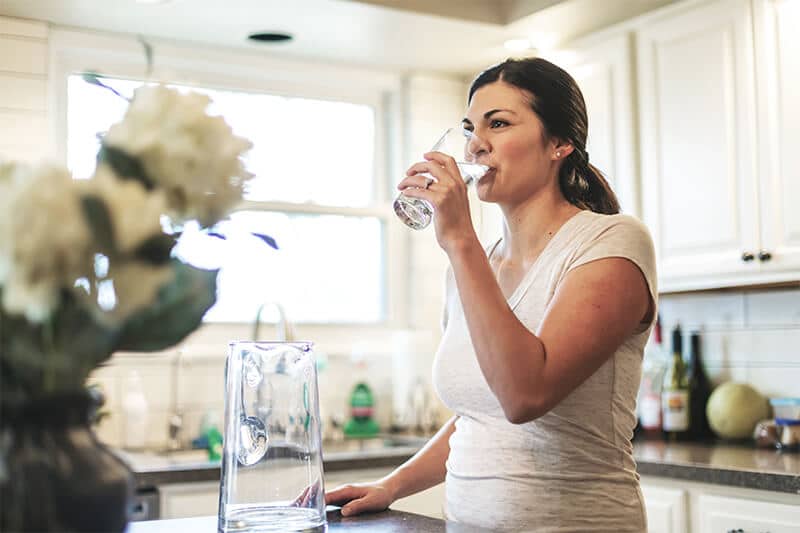
You know diet plays a major role in your overall health and wellness so it will hardly come as a surprise to you that it’s also key when easing a specific health condition. There are changes you can make, starting with the food you eat, that may help with PMS symptoms.
- Eat A Balanced Diet All The Time: When it comes to PMS, it’s important to eat a balanced diet — and not just during or ‘near’ that time of the month. When you consume the nutrients your body needs to thrive, all the time, you help support your overall health and wellness. And that can help prevent PMS mood swings and physical symptoms from cropping up in the first place!
- Stay Hydrated! Sure, you hear it all the time. Drinking lots of water each day is essential. But, it’s so often talked about because it’s true! And when you’re talking specifically about PMS symptoms, drinking plenty of water helps you have a healthy flow and can help ease cramps.
- Go Sugar-Free: Sure, you may be craving something sweet when you’ve got PMS, but it’s best to avoid the temptation! Or, at least, enjoy sugar in moderation. Why? Because sugar is naturally inflammatory. Sugar can worsen cramping, cause bloating, and send blood sugar levels on a roller coaster that’ll only make those monthly mood swings worse. It also makes already-prone-to-acne skin more likely to break out. While a sugary treat is enjoyable sometimes, before and during your period, it is best to shy away from the sweets!
- Stay Away From Salt: Eating a high sodium diet can make you more bloated! And, depending on your PMS symptoms, you may already be prone to bloating. Avoid salt to help reduce the amount of bloating you experience..
- Skip The Caffeine: This one’s so hard if you love a morning (ok fine, and mid-morning, and afternoon, and late-afternoon) coffee. But, caffeine can amp up emotional and mental PMS symptoms. It’s also been shown to increase breast tenderness, which is another uncomfortable symptom you may experience with PMS. So, if you can, grab a soothing green or chamomile tea instead of your favorite latte when you’re nearing that time of the month.
- Avoid Alcohol, Too: We know, we know, you definitely want to reach for that bottle of wine when your period is right around the corner. But, it’s a good idea to hold off on the rosé until after your period’s over. Alcohol contributes to inflammation and it’s usually loaded with sugar.
Okay, so what should you eat? Probably, exactly what you’d expect. Lots of healthy grains, fruits, veggies, and healthy fats!
- Complex Carbs Can Help: They help you feel full! Eating a diet filled with fiber-rich whole grains and complex carbs supports healthy digestion and can help prevent you from giving in to any unhealthy food cravings when you have PMS.
- Eat More Often! When you’re bloated, achy, and sore, you may feel inclined to enjoy a large meal and call it a day. But, choosing smaller meals and eating more frequently may be the best option when dealing with PMS. It can help prevent bloating and other GI distress. Plus, it’s better for your blood sugar levels and may reduce mood swings and bouts of fatigue.
Herbal remedies for PMS
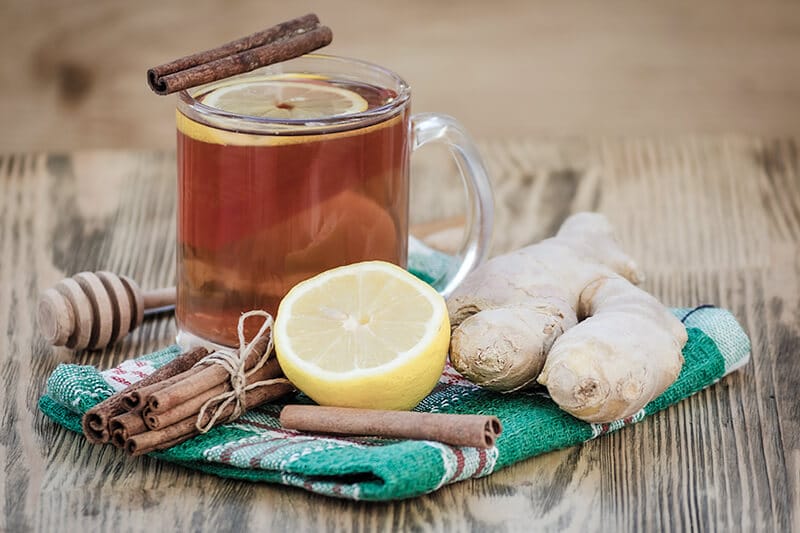
In addition to diet and lifestyle changes, consider herbal remedies for PMS symptom relief! There are countless compounds and herbs that are seriously powerful and they’re easy to add to your daily routine.
- Herbs for PMS: Add Raspberry Leaf Tea or herbal capsules to your daily diet. Raspberry leaves are one of the best ways to gently and naturally support female reproductive health. For some women, simply one cup of this tea a day is enough to completely or greatly reduce PMS symptoms.
- Herbs For Menstrual Cramps: Experiencing a whole lot of cramp pain? Go for ginger! It’s been shown to naturally help with menstrual pain, so brew some ginger tea, add some freshly chopped to your dinner, or toss some into a smoothie to support natural PMS cramp relief.
- Herbs For PMS Mood Swings: If you feel like your emotions are on a rollercoaster and you want off to get the ride, sip some chamomile tea. Or use a chamomile essential oil. Or dip your feet into a chamomile soak!
- Herbs For Heavy Menstrual Flow: We know, we know — as soon as your flow begins, those symptoms aren’t actually PMS anymore. But, because many women experience this, we wanted to throw out a tip. Try cinnamon! Put it in your coffee, your food, or use it as an essential oil. It may help to gently ease heavy bleeding and cramping.
- Herbs For Bloating: Feel like your gut’s about to burst? Banish that roly, roly, uncomfortable bloated feeling with some peppermint or wormwood! Both support healthy digestion and have been studied for their effects on indigestion and abdominal discomfort.
The Healthy Place PMS supplements that can help ease symptoms

There are some key nutrients that have been proven to help relieve PMS symptoms naturally, and support your overall health and wellness to help prevent PMS symptoms from bothering you. It’s easy to add these nutrients to your diet with supplements.
And at The Healthy Place, we carry countless PMS supplements to support you before, during, and after your monthly cycle. Here are some of our staff and customer favorites for natural PMS relief:
- Need to balance your hormones? Get Even is here to help you feel like YOU again, no matter what day of the month it is! This women’s balance supplement naturally promotes hormonal harmony with holistic ingredients like chasteberry, shatavari, and dong quai. But that’s not all! Get Even also soothes symptoms of PMS or painful periods with vitamin B1, ginger, and chamomile.
- For pain and balance, reach for Terry Naturally CuraMed + DIM Complex. It’s formulated with a potent blend of herbal extracts that help with hormone balance, something that’s extra important when you’re dealing with PMS. Curcumin and French Grape Seed help with natural pain relief, promote a balanced mood, and even support a healthy metabolism. Talk about a powerful combo!
- Mood yo-yo-ing all over the place? Grab Solgar PM Phytogen Complex. It contains a potent dose of Pueraria Mirifica Root, a compound that’s full of phytoestrogens to support a balanced mood. It also contains B-vitamins to help give you energy when you’re feeling fatigued. B6 is often prescribed by doctors to help with moodiness and irritability related to PMS.
- Bloated and uncomfortable? Take a probiotic like Flora Basilica Everyday Nourish 25 Billion. It’s no secret that digestive wellness can affect almost every function in your body. It’s important to keep your GI tract healthy all the time. But, when you have PMS, taking a probiotic supplement is extra important. That bloating, gassy, crampy feeling you’re experiencing? Probiotics can help with that!
- For muscle pain and cramping, add a Magnesium supplement like Lively Vitamin Co. Magnesium Ease to your diet. Magnesium supplements are perfect for relaxing muscles, soothing digestive upset, and calming stress. In fact, magnesium for PMS is one of our top recommendations to help with those uncomfortable symptoms!
- Add Calcium for PMS support with MegaFood Calcium And Magnesium. As you menstruate, the Calcium levels in your body change. Taking a calcium supplement helps ensure you’ve got the calcium your body needs for health and wellness. But, more importantly, calcium can also help ease some PMS symptoms such as brain fog, fatigue, and mood swings. Sign us up for some Calcium, please!
- Feeling extra moody? Add Omega 3 for PMS with a supplement like Terry Naturally Vectomega. Fatty Acids are so important to your diet, but especially when you have PMS. Omega 3 Fatty Acids can help with mood and mental health. Plus, that acne you’ve got thanks to PMS, Omega 3 for PMS can help your skin recover from blemishes. This supplement contains Omega 3 in whole-food-form and plenty of bioactive peptides, a potent combo!
- Hormones have you feeling fatigued? Try Vitamin D for PMS! Try a supplement like Solar Power. Vitamin D can help with maintaining healthy hormone balance. It can also boost your mood, so it’s definitely a good idea when you have PMS.
- Sore, achy, and inflamed? Add Lively Vitamin Co. CuraHealth to your diet to help provide some PMS pain relief! It’s full of Curcumin, one of the most potent and powerful antioxidants around. It supports a healthy inflammatory response, which is key when it comes to cramps and back aches.
- Herbal supplements are here to help too! Chasteberry, red raspberry leaf, black cohosh and evening primrose oil are all excellent supporters that help balance hormone levels and can reduce various symptoms of PMS.
SOME OF OUR RECOMMENDED PRODUCTS
-
Lively Vitamin Co. CuraHealth SoftgelsProduct on saleOriginal price was: $111.11.$88.89Current price is: $88.89.
-
MegaFood Calcium and Magnesium TabletsProduct on saleOriginal price was: $39.99.$32.99Current price is: $32.99.
-
Terry Naturally VectomegaProduct on saleOriginal price was: $51.95.$41.56Current price is: $41.56.
There are options when it comes to natural PMS relief for women. Adjust your lifestyle, get your diet in line and add some PMS-supportive supplements to your daily routine. If you’d like more advice on specific supplements to try, don’t hesitate to reach out to our team! We’re here when you want to talk PMS, menstruation, or anything in between. Contact us via email, or live chat.


